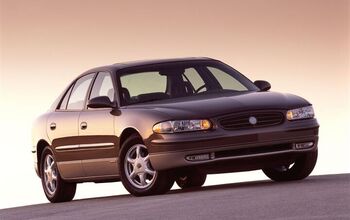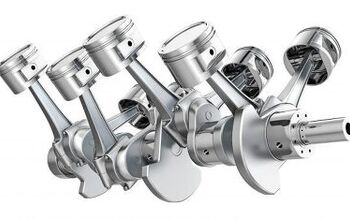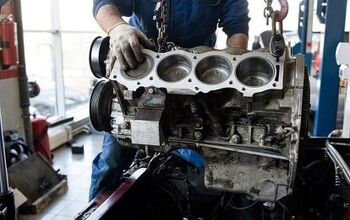Piston Slap: RTFM FTW

It actually comes with a little book too!
Patrick writes:
Hi Sajeev,
Avid daily reader of the site but infrequent commenter… Pony Cars and old Volvos sometimes drag me out of my shell but I have a couple questions about my wife’s car and I wanted to see what you and others might think.
We’ve got a 2007 3.5L Impala with 60,000 miles on it and it is due for an oil change and checkup:
1. Am I crazy for trusting the car’s computer to tell me when to change the oil? The car monitors oil life and reports a % of oil life remaining and nags me when it’s time for an oil change. The owners manual doesn’t specify a mileage interval instead advising to change it when the car’s info center says it’s time. It typically runs from 8K to 11K miles between changes so far.
Now, I know I don’t have to take it to the dealer and while I do almost all of my own service, repairs and upgrades on my car, wrenching on our utilitarian transportation-mobile isn’t nearly as rewarding and I don’t mind throwing the Chevy place a bone every once-in-a-while, especially since their service isn’t much more than the quicky oil change places and, theoretically at least, they should be intimately familiar with this generation of Impalas – plus if and when it comes time to trade it in or sell it, I’ll have nice official looking dealer records to go with it.
2. When I realized 60K was coming up, I rushed to the owners manual to see what expensive work the dealer was going to want to do – then I remembered this wasn’t a European car and there was nothing other than greasing door hinges and locks and inspecting a few wear items that needed to be done. I did notice that the book calls for a fluid replacement at 150K miles for the 4T65-E transmission (or at 75K for severe duty). After reading some of auto transmission horror stories here but not being aware of any endemic problems with GM’s transverse V6 transes is 150K too long to go, should I plan on doing that sooner? 100K, 125K, if we still have the car that long or is GM pretty close to the mark on that?
Sajeev answers:
I never thought that answering a GM W-body question would be a breath of fresh air in my Piston Slap queue, but well, here we are. Patrick has valid and relevant questions to anyone with a less than desirable ride that does the job and keeps you mobile. You know, cars for the vast majority of us!
So let’s do this thing:
I trust that oil life meter after years of questioning it via dipstick eyeballing. Now that I run synthetic oil (in cars that never officially required it), I change the oil after about 180% of its life: that is, resetting it once and then changing it when its 80% used. It seems like the smartest way to not waste good oil, and my driving conditions merit it: lotsa traffic, heavy engine loads (aftermarket stereo, A/C) and brutal Gulf Coast summers. The 180% mark turns into 6000-8000 miles of my commute. Which is fair for synthetic oil.
It works for me, maybe I should take my used oil examined to a lab to prove it to everyone…but I don’t really care since it’s been working for well over 175,000 miles on my very, very healthy Lincoln Mark VIII motor. Healthy enough to let me (cautiously at first) trust the life meter on other cars too. More to the point, your driving conditions can and will vary.
Send your queries to sajeev@thetruthaboutcars.com. Spare no details and ask for a speedy resolution if you’re in a hurry.

More by Sajeev Mehta
Latest Car Reviews
Read moreLatest Product Reviews
Read moreRecent Comments
- Urlik You missed the point. The Feds haven’t changed child labor laws so it is still illegal under Federal law. No state has changed their law so that it goes against a Federal child labor hazardous order like working in a slaughter house either.
- Plaincraig 1975 Mercury Cougar with the 460 four barrel. My dad bought it new and removed all the pollution control stuff and did a lot of upgrades to the engine (450hp). I got to use it from 1986 to 1991 when I got my Eclipse GSX. The payments and insurance for a 3000GT were going to be too much. No tickets no accidents so far in my many years and miles.My sister learned on a 76 LTD with the 350 two barrel then a Ford Escort but she has tickets (speeding but she has contacts so they get dismissed or fine and no points) and accidents (none her fault)
- Namesakeone If I were the parent of a teenage daughter, I would want her in an H1 Hummer. It would be big enough to protect her in a crash, too big for her to afford the fuel (and thus keep her home), big enough to intimidate her in a parallel-parking situation (and thus keep her home), and the transmission tunnel would prevent backseat sex.If I were the parent of a teenage son, I would want him to have, for his first wheeled transportation...a ride-on lawnmower. For obvious reasons.
- ToolGuy If I were a teen under the tutelage of one of the B&B, I think it would make perfect sense to jump straight into one of those "forever cars"... see then I could drive it forever and not have to worry about ever replacing it. This plan seems flawless, doesn't it?
- Rover Sig A short cab pickup truck, F150 or C/K-1500 or Ram, preferably a 6 cyl. These have no room for more than one or two passengers (USAA stats show biggest factor in teenage accidents is a vehicle full of kids) and no back seat (common sense tells you what back seats are used for). In a full-size pickup truck, the inevitable teenage accident is more survivable. Second choice would be an old full-size car, but these have all but disappeared from the used car lots. The "cute small car" is a death trap.


































Comments
Join the conversation
@Zackman- Your usage supports particularly long change intervals since most of the time your engine is running it is fully warmed up. You can save some money by letting the oil life warning tell you when to change. If you want to be conservative, change it at 80-90% oil life. Can't go wrong changing more frequently, but you may waste your money.
Patrick I have the Pontiac equivalent to your Impala and I believe both W's use the same transmission. I asked the transmission fluid question of my Aamco guy, he replied and I quote: "here [in Pittsburgh] you have extreme heat and extreme cold coupled with a very hilly landscape. If this were Ohio you could probably stick to 50,000 miles, but here I would drop the pan and change it every 25,000 or so". I was changing mine at 55,000 shortly after I bought it. The other part of it that I ran into is the transmission fluid filter gets clogged/dirty just like any other fluid filter. I noticed the transmission fluid temperature (on the computer) would jump to 120+ degrees very quickly after startup. After my fluid/filter change on spring/winter/fall days it warms up slower than the actual engine temp, and never seems to get much higher than 116 (in local driving). I theorize it was jumping higher on start-up because fluid wasn't circulating properly to properly cool the transmission. My two cents.